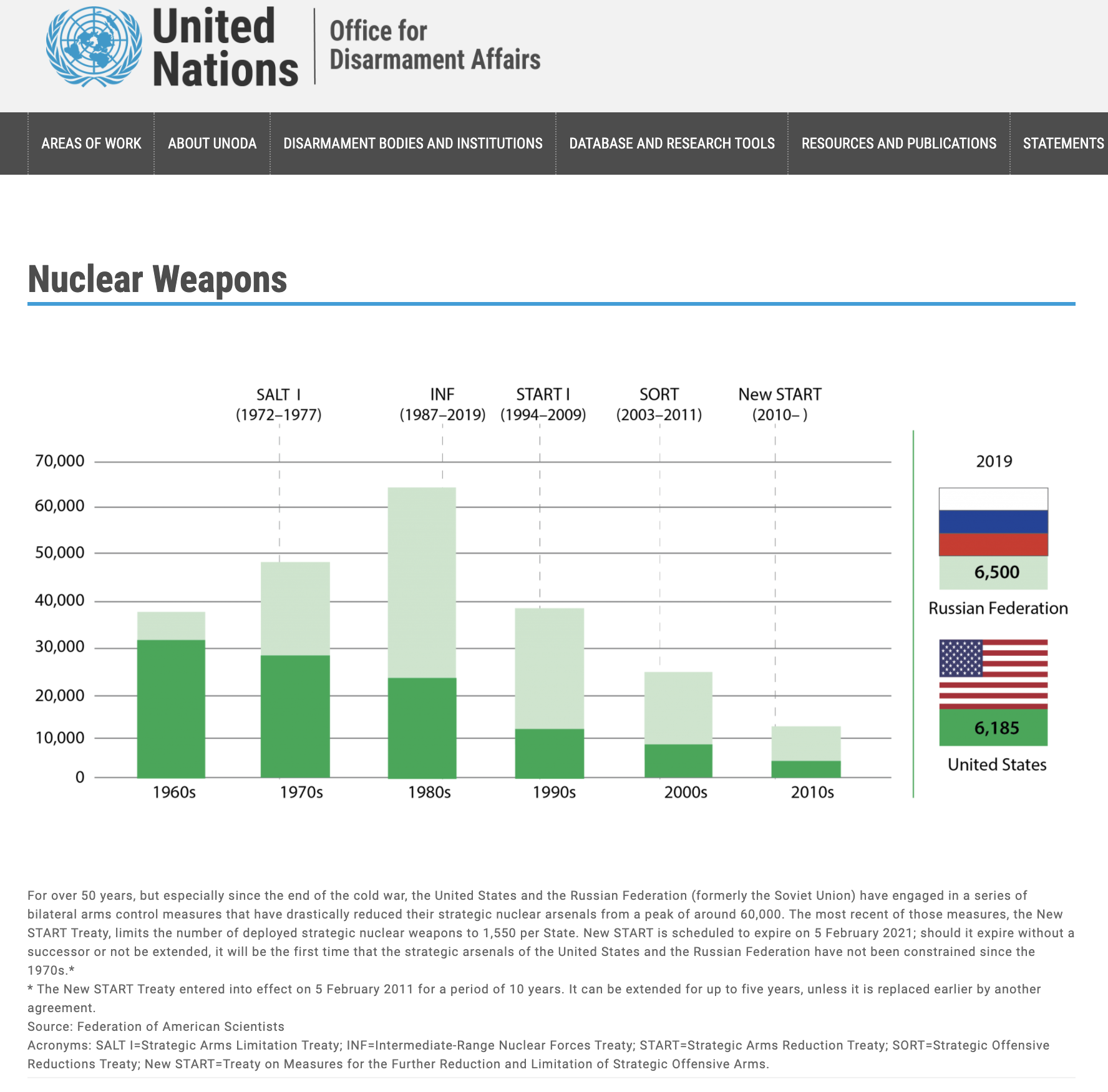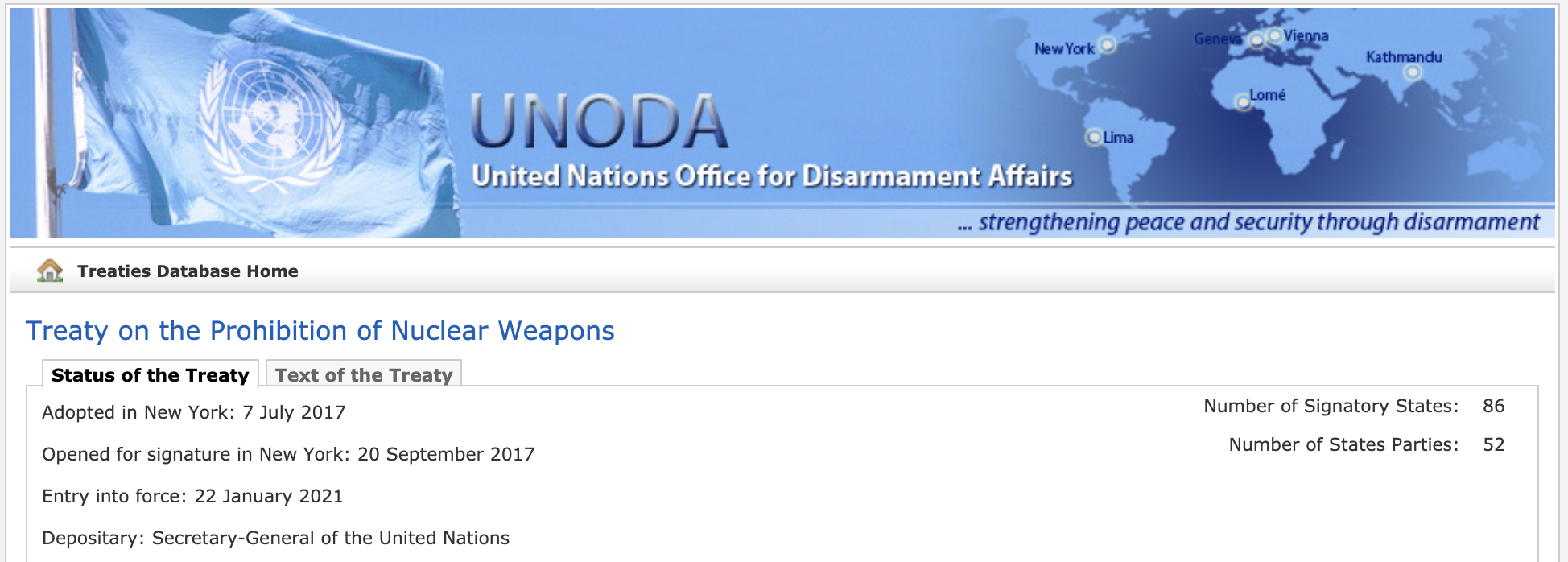The Treaty on the Prohibition of Nuclear Weapons Enters Into Force Today
The Treaty on the Prohibition of Nuclear Weapons (TPNW) enters into force today, 90 days after the deposit of the 50th instrument of ratification. So far, a total of 86 countries have signed the treaty, which complements existing disarmament measures like the Non-Proliferation Treaty (NPT).
The TPNW is a significant milestone in the long and global effort to achieve a world free from nuclear weapons. The 86 countries that have signed so far are also signatories to the NPT––which also calls for nuclear disarmament––but signed on to the TPNW in apparent frustration over what they consider inadequate progress by the nuclear-armed states in fulfilling their NPT obligations. As we wrote in July 2020, on the 75th anniversary of the Trinity Nuclear Test:
Nuclear-armed states largely do not appear to consider nuclear disarmament to be an urgent global security, humanitarian, or environmental imperative. Instead, most states seem to consider disarmament as a type of chore mandated by the Non-Proliferation Treaty – and not one that they are seriously interested in completing in the foreseeable future.
It is increasingly rare to hear any officials from nuclear weapon states express a coherent rationale for pursuing disarmament other than as a result of the obligation to do so under the Non-Proliferation Treaty. Moreover, they seem increasingly focused on shifting the disarmament responsibility onto the non-nuclear states by arguing they first must create the security conditions that will make nuclear disarmament possible.
The Treaty on the Prohibition of Nuclear Weapons seeks to turn this reality on its head. Rather than listening to another half-century of excuses from the nuclear-armed states that they can’t disarm, the countries behind the TPNW seek to take the initiative and increase pressure on the nuclear-armed states to adopt disarmament measures.
Unfortunately, no matter how many countries sign it, the TPNW does not eliminate any nuclear weapons unless the nuclear-armed states join and implement the treaty’s provisions. They are not legally bound by the prohibition unless they sign the treaty. So far, they have refused, boycotted meetings, and even pressured countries not to sign on. Rather than a ban, they argue that “an incremental, step-by-step approach is the only practical option for making progress towards nuclear disarmament…”
However, decades of trying that approach has left the world with more than 13,000 nuclear weapons, led to a slowed pace of reductions, increasing modernization programs––and in some cases, increasing nuclear arsenals, worsening military tensions, reaffirmations of the enduring role and importance of nuclear weapons, and the discarding of arms control agreements. Non-nuclear armed states would seem justified in wanting to try something new.

FAS is honored that the United Nations Office for Disarmament Affairs uses our nuclear weapons estimates. For latest updates, go here.
Whether or not one believes the TPNW is the right approach, the Treaty is a reality and now in force. More NPT countries are likely to join. While the Treaty may not immediately create disarmament, it is supported by a significant number of the states party to the NPT. Additionally, the TPNW includes welcome and unprecedented provisions on humanitarian assistance and environmental remediation, which offer a bridge to nuclear-armed states and their allies by allowing them to engage with these provisions without immediately signing the treaty.
Now that the Treaty is in force, instead of continuing to boycott and reject their efforts and motivations of its supporters, the nuclear-armed states must work with them to achieve responsible reductions of nuclear forces and create the conditions that would allow them to be eliminated.
Background Information:
• UN: Treaty on the Prohibition of Nuclear Weapons (TPNW)
• FAS: Status of World Nuclear Forces
The Federation of American Scientists is honored to provide the world with the best non-classified estimates of the nuclear weapons arsenals. We are grateful for the financial support from the New Land Foundation, MacArthur Foundation, Ploughshares Fund, and the Prospect Hill Foundation to do this work. To explore this vast data, developed over many decades, start here.
While it is reasonable for governments to keep the most sensitive aspects of nuclear policies secret, the rights of their citizens to have access to general knowledge about these issues is equally valid so they may know about the consequences to themselves and their country.
Nearly one year after the Pentagon certified the Sentinel intercontinental ballistic missile program to continue after it incurred critical cost and schedule overruns, the new nuclear missile could once again be in trouble.
“The era of reductions in the number of nuclear weapons in the world, which had lasted since the end of the cold war, is coming to an end”
Without information, without factual information, you can’t act. You can’t relate to the world you live in. And so it’s super important for us to be able to monitor what’s happening around the world, analyze the material, and translate it into something that different audiences can understand.
